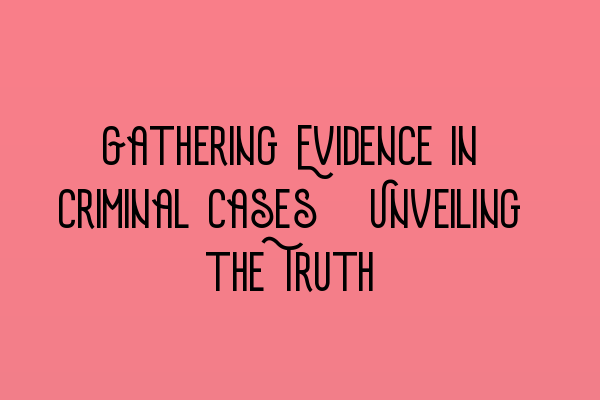Gathering Evidence in Criminal Cases: Unveiling the Truth
Welcome to the official blog of SQE Criminal Law & Practice Law UK. In today’s post, we will delve into the important topic of gathering evidence in criminal cases. As a solicitor, it is crucial to understand the intricacies of this process in order to uncover the truth and ensure justice is served.
The Importance of Gathering Evidence
When a crime is committed, the first step in the legal process is gathering evidence. Evidence plays a pivotal role in building a strong case for both the prosecution and the defense. It enables solicitors to establish the facts, identify the guilty party, and present a compelling argument in court.
At SQE Criminal Law & Practice Law UK, we believe in thorough and meticulous evidence collection. Our experienced solicitors recognize the significance of every piece of evidence, no matter how seemingly insignificant it may appear. Each detail has the potential to impact the outcome of a case and contribute towards a fair trial.
The Types of Evidence
There are various types of evidence that can be collected in criminal cases. It is essential to understand the nature of each type and the procedures involved in obtaining them. Some common forms of evidence include:
- Witness statements
- Forensic evidence
- Physical evidence
- Documentary evidence
Witness statements can provide firsthand accounts of the event in question and can be crucial for establishing the sequence of events. Forensic evidence, such as DNA analysis and fingerprints, can link a suspect to a crime scene. Physical evidence, such as weapons or stolen goods, can serve as tangible proof. Documentary evidence, such as contracts or emails, can support or challenge the assertions made by the parties involved.
The Process of Gathering Evidence
Successful evidence collection requires a systematic approach. Solicitors at SQE Criminal Law & Practice Law UK follow a meticulous process to ensure no stone is left unturned. This includes:
- Identifying potential sources of evidence
- Preserving and protecting the evidence
- Gathering witness statements
- Conducting forensic examinations
- Collaborating with experts
- Reviewing and organizing the evidence
By following this comprehensive process, solicitors can build a strong case and present the evidence in a compelling manner.
The Role of Technology in Evidence Gathering
In today’s digital age, technology has revolutionized the way evidence is gathered. Digital evidence, such as CCTV footage, social media posts, and electronic communications, has become increasingly relevant in criminal cases. Solicitors at SQE Criminal Law & Practice Law UK stay up-to-date with the latest technological advancements to effectively gather, analyze, and present digital evidence.
With the rise of smartphones and digital devices, evidence can be found in unexpected places. It is crucial for solicitors to understand the intricacies of digital evidence and ensure its admissibility in court. Our solicitors are well-versed in handling digital evidence and have the expertise to navigate complex technical issues.
Conclusion
Gathering evidence in criminal cases is a fundamental step towards unveiling the truth and ensuring justice is served. It requires a meticulous approach, thorough understanding of the different types of evidence, and the ability to adapt to technological advancements.
If you are interested in learning more about criminal law practice, visit our related articles below:
- SQE 1 Practice Exam Questions
- SQE 1 Practice Mocks FLK1 FLK2
- SQE 2 Preparation Courses
- SQE 1 Preparation Courses
- SRA SQE Exam Dates
Thank you for reading and stay tuned for more insightful content from SQE Criminal Law & Practice Law UK!
